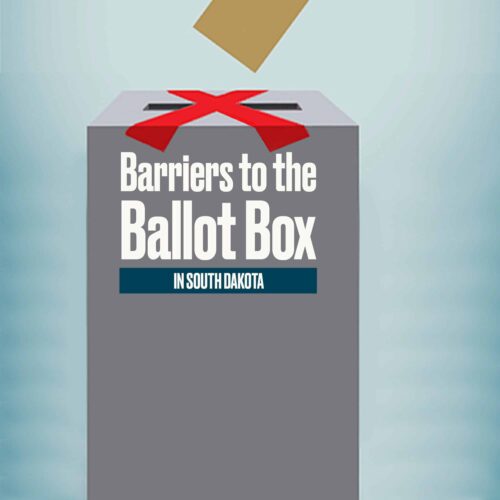Introduction
Native Americans, who represent 10% of South Dakota’s population, are far less likely to have their votes counted than the state’s white residents.
A shortage of polling places accessible to tribal lands was reflected in a 2017 survey finding that 32% of Native Americans in the state said the distance they had to travel to vote could prevent them from doing so. According to the Brennan Center for Justice, that trip for some was more than 150 miles.
Sign up for The Moment newsletter
Our CEO Susan Smith Richardson guides you through conversations and context on race and inequality.
They’ve been disproportionately affected by felony disenfranchisement and voter ID laws, like Native Americans in other parts of the country.
They are more likely to have nontraditional addresses that make it more difficult to register to vote and cast a ballot.
And a nationwide concern about slow U.S. Postal Service delivery can be even worse on tribal lands, removing voting by mail as a solid alternative for some.
Here’s a look at some of the most significant barriers to voting rights and access in the state:
Voter ID
Amid a nationwide push that advocates have called a voter disenfranchisement tactic disproportionately affecting Black, Latino and Native American citizens, South Dakota passed legislation in 2003 requiring that a photo ID be presented at the polls in order to vote.
Acceptable forms include a South Dakota driver’s license or nondriver ID card, a passport or other ID issued by the federal government, a student ID from a South Dakota high school or accredited college, or a tribal photo ID.
But a tribal ID is not allowed as a valid form of identification to register to vote in the first place, something that advocates say discriminates against Native Americans. Earlier this year, lawmakers rejected legislation that would have allowed it.
Absentee ballots
South Dakota mailed absentee ballot applications to every registered voter this year amid concerns about the COVID-19 pandemic.
Ballots must be received by Election Day to be counted. That’s raised some concerns, given delays this year with Postal Service delivery. The state also provides secure drop boxes to return ballots and allows early voting at county offices, but in one of the largest and most sparsely populated states in the country, that can mean a trip of dozens of miles for some residents.
South Dakota does not have online voter registration, and its cutoff for registering is two weeks before the election.
And unlike some states that require voters to be notified and given the opportunity to fix the issue, there is no “curing” process in South Dakota law for absentee ballots that are rejected due to a missing signature or other problem. More than 1,200 ballots were tossed out for such issues during the state’s primary election this year.
Felony disenfranchisement
South Dakota goes farther than most states in taking voting rights away from people convicted of felonies, a post-Civil War tactic aimed at disenfranchising Black people. It continues to disproportionately impact Black, Latino and Native American citizens.
In South Dakota, voting rights are removed upon conviction of a felony and can’t be restored until someone has served their prison sentence, probation and/or parole, and also has paid all court fees, fines and restitution associated with the case.
Earlier this year, state lawmakers rejected legislation that would have removed the requirement that fees and fines be paid before voting rights are restored.
Read more in Money and Democracy
US Polling Places
In New Jersey, a switch to vote by mail and partial end to felony disenfranchisement
The state is sending a ballot this year to every registered voter, including those on probation and parole.
US Polling Places
Civil rights groups have blocked efforts to restrict voting in Montana
Native Americans have also succeeded in challenging policies that would disenfranchise them.


Join the conversation
Show Comments